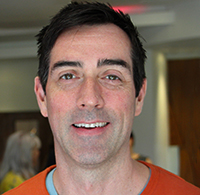START has welcomed a Fulbright scholar this semester, who will work with the Radicalization and Disengagement (RaD) team on studying deradicalization.

Dr. Neil Ferguson is a Professor of Political Psychology at Liverpool Hope University, whose research mainly focuses on the conflict, division and peace process in Northern Ireland.
“I’m from Northern Ireland,” Ferguson said. “I was born in Ulster close to the start of the Troubles, in 1970. I lived in a high-violence area, where there was always a problem with sectarianism. So the conflict in a way was part and parcel of my life.”
When he was doing his undergraduate and doctoral work at the University of Ulster, Ferguson had the opportunity to study psychology with a professor named Dr. Ed Cairns, who was studying the Northern Irish conflict through a social psychological viewpoint.
“It was a real wake up call for me to channel this interest in the Northern Irish conflict into the discipline of psychology, and try to understand the things that I could see on the streets around me, things that I’d taken for granted – stereotyping, issues around social identity and conflict, biases – all these sorts of things that I was seeing every day,” Ferguson said.
Ferguson began looking at the Northern Irish conflict and peace process in the early 1990s, studying whether living through the violence had a negative impact on an individual’s development, such as their ability to solve problems, as well as the effect the peace process had on their thinking.
“I did some work looking at how a sample of adolescents – people about 17 years old – perceived the conflict, such as what they thought peace or war meant, and how they thought the conflict in Northern Ireland might be solved,” Ferguson said. “Sort of by accident I started doing this research before the ceasefires came in 1994, so then I did another study afterwards to see if the peace process changed people’s attitudes towards peace, towards conflict resolution, towards understanding warfare – and it did.”
His research indicated that during the peace process people began to see the conflict not as an “us versus them” issue, but as a mutual issue, with both sides involved. The peace process also helped to introduce new concepts to people living through the conflict.
“When I did the research before the ceasefires, the most common response to the question of how to solve the conflict in Northern Ireland was ‘I don’t know.’ No one knew,” Ferguson said. “After the peace process started, people began to give suggestions, but those suggestions were invariably based on what was happening. So things like having a ceasefire, or decommissioning weapons – they were based on what was happening in society at the time.”
These findings inspired Ferguson to switch from quantitative to qualitative work, and he began to interview individuals involved in the conflict and in the work of the peace process – politicians, community workers, religious figures, and also the people who were in the leadership of different armed groups. This research explored the gradual change in their negotiations and their understanding of peace and conflict, to identify what they wanted peace in Northern Ireland to look like. Following the terrorist attacks of September 11, 2001, this research took on a broader significance.
“All of a sudden everyone wanted to know how people got involved in violence,” Ferguson said. “Some of the research we had done already had looked at that, because we had talked to people who had been involved in armed groups about how they had gotten engaged in violence, what war and peace was, what conflict was, and how we avoid conflict.”
Ferguson focused his work on radicalization trajectories, interviewing extremists about engaging in violence, and how they made the transition from being a civilian to being an armed combatant.
“We’ve tried to look over the last 10 years or so at the lifecycle of the militant,” Ferguson said. “How people began to engage, and what the factors were that motivated their engagement, but also one of the things we looked at that most people didn’t, was what happens to the militant. Once you get involved in violence, it’s a very dangerous job for you, as well as the harm you cause others through your violence. So we also looked at those experiences, the impact that they have on this extremist lifestyle.”
This research also explored the deradicalization and disengagement process, the ways in which radicalized individuals can move away from extremist groups or engaging in violence.
“Extremist violence is really pro-group antisocial behavior,” Ferguson said. “What we’re trying to do is get people to engage in more pro-group prosocial behaviors. So using their affiliations, their identities and attachments to these groups, and using that in a positive way that can create momentum, but to use that momentum for positive change rather than negative change.”
Ferguson has applied this research to work he has done in the United Kingdom with the Home Office and the Ministry of Defense, as well as in other European countries, Australia and with the U.S. Department of Defense.
His work with START now will involve studying comparative case studies with the RaD team, leveraging his knowledge of radicalization in Northern Ireland and data from the Profiles of Individual Radicalization in the United States (PIRUS) dataset and the Bias Incidents and Actors Study (BIAS).
Ferguson noted that the course of his career was largely impacted by the violence he saw firsthand as a child, growing up in the height of the Troubles in Ulster.
“I’ve witnessed shootings. I have relatives and friends who’d been murdered. My family had to move house because people came into our back garden and threatened to kill us all,” Ferguson said. “Living through conflict, you have these kinds of experiences. That shaped my interests – it was either pick up the gun or pick up the pen. So I decided I would try to understand it.”
